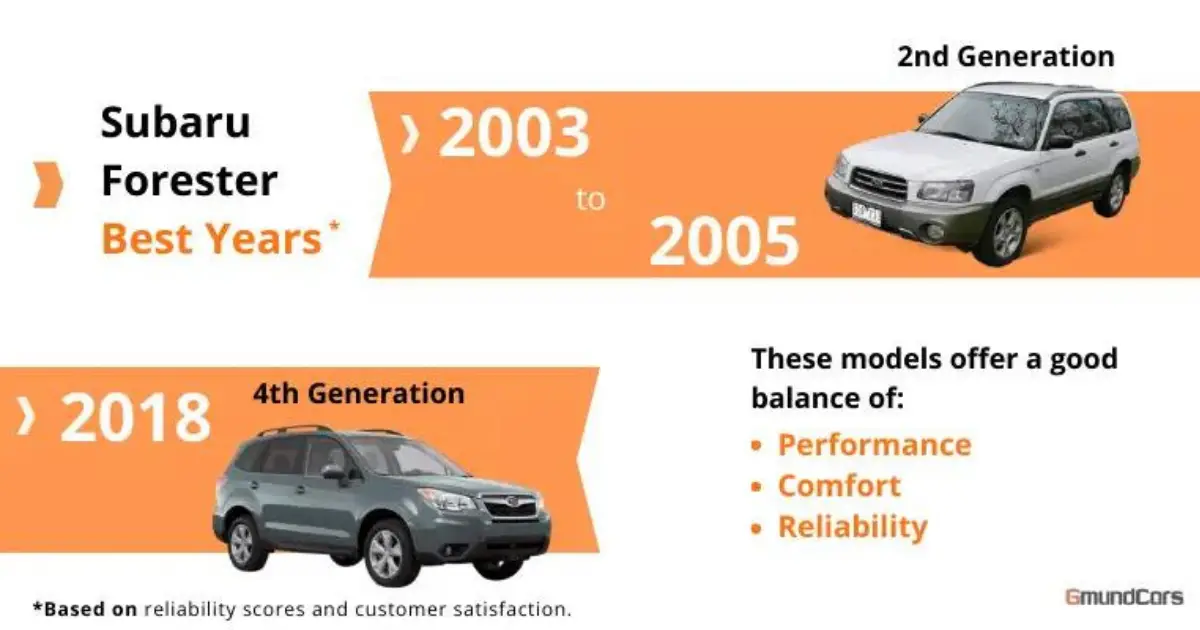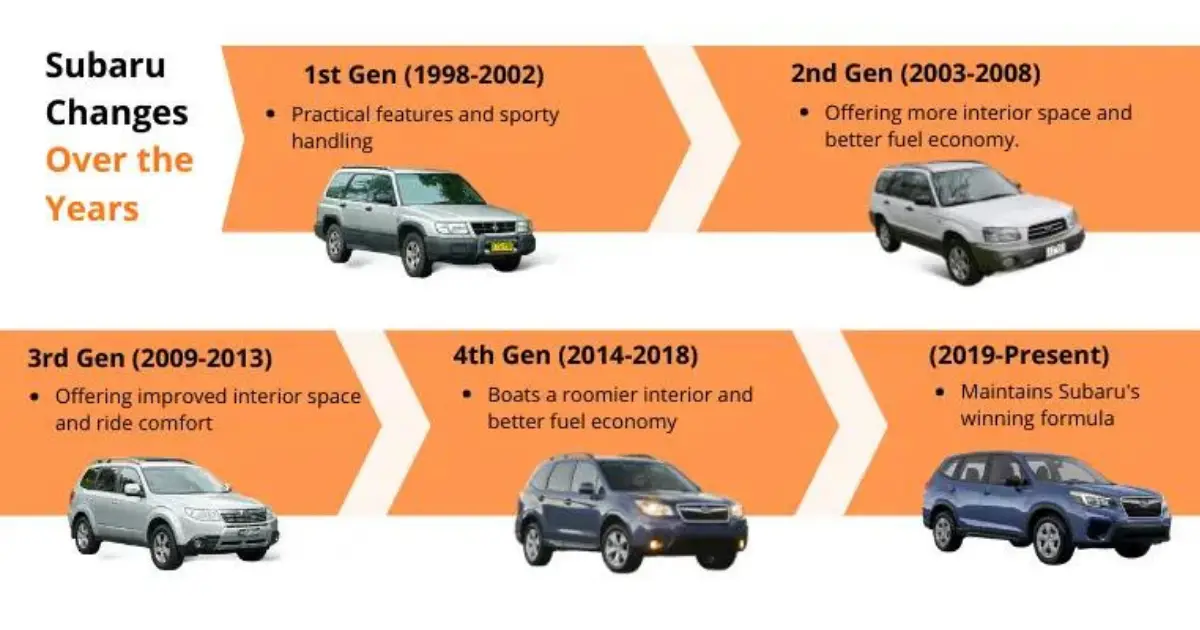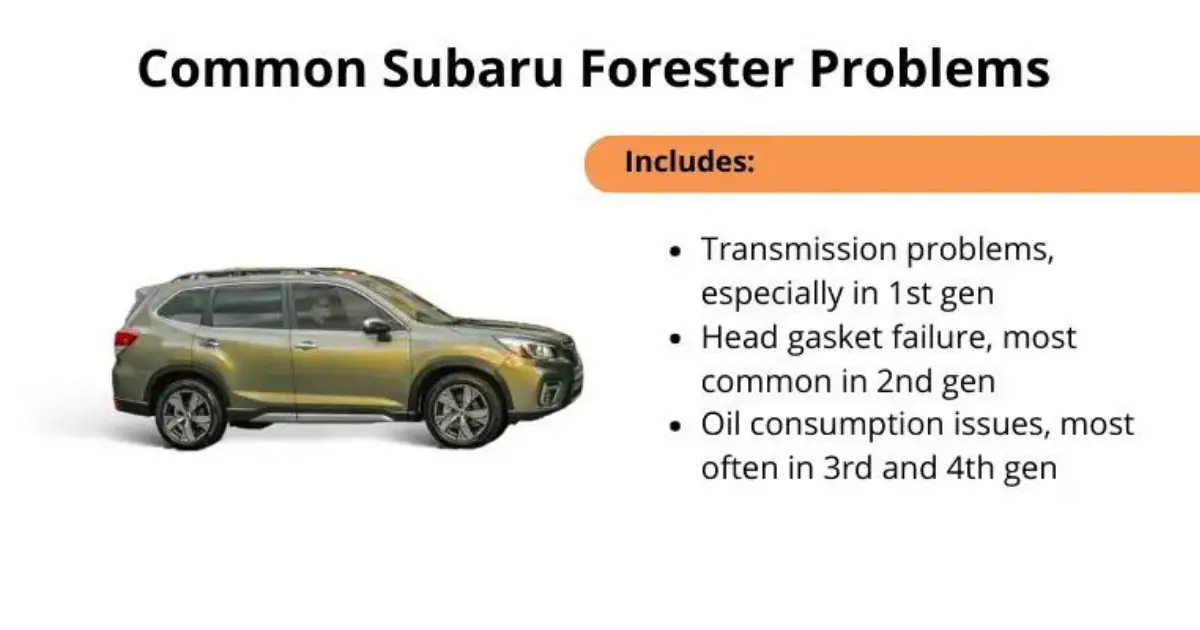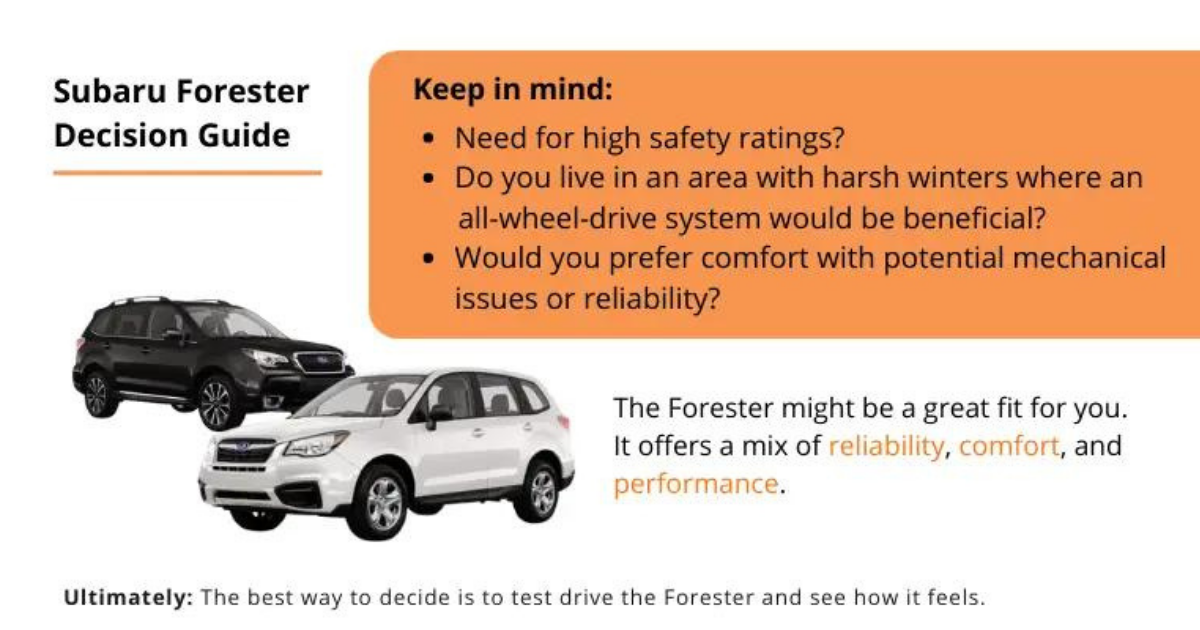The Subaru Forester is well-known for its superior safety features, excellent resale value, and standard all-wheel-drive system designed for outdoor enthusiasts. Yet, with a range of years to select from, how do you pinpoint the most dependable production year of the Subaru Forester to buy?
In this comprehensive guide, we will delve into each Forester generation, the years to avoid, and the most reliable years based on customer satisfaction and reliability scores. Let’s get started!
What Are The Best Years For The Subaru Forester? Why?
When it comes to the best years for the Subaru Forester, the 2003-2005 models and the 2018 model year stand out due to their high reliability scores and customer satisfaction ratings.

Notably, the 2003-2005 models are part of the second-generation Forester, offering sharp steering and a comfortable ride. On the other hand, the 2018 Forester, a model from the fourth generation, boasts a high reliability score and minor issues.
How Do These Years Compare To Others
Contrary to the 2003-2005 and 2018 models, some years of the Subaru Forester are best avoided due to their inherent mechanical issues and low reliability scores.
Notably, the 2006 model year of the second generation received a low reliability rating due to major trouble spots such as the engine, cooling components, and transmission. Similarly, the 2009 and 2010 models of the third generation are also known for their mechanical issues and a high number of recalls.
How About The Outback?
> Subaru Outback Years to Avoid
What Has Subaru Changed?
Over the years, Subaru has made considerable changes to the Forester. Here’s a breakdown by generation:

- First-generation Foresters (1998-2002), were known for their practical features and sporty handling. However, they had reliability issues, particularly the need for a head gasket redo.
- Second-generation Foresters (2003-2008) was marked by a significant redesign, offering more interior space and better fuel economy. However, this generation also had its share of least reliable years, particularly the 2014, 2015, and 2017 models, which had a high number of complaints.
- Third-generation Foresters (2009-2013) made substantial gains with its redesign, offering improved interior space and ride comfort. However, many models from this batch had severe mechanical issues.
- Fourth-generation Foresters (2014-2018) came with significant redesigns, including a roomier interior and better fuel economy. However, the 2014, 2015, and 2017 models had a high number of complaints and are best avoided.
- Fifth-generation Foresters (2019-present) maintains Subaru’s winning formula for its SUV lineups. All the models from this generation have at least a reliability rating of 4.0 out of 5.0.
Related: Subaru Dashboard Lights and Meanings
Is The Subaru Forester Reliable? Yes And No
While certain years of the Subaru Forester are highly reliable, others are best avoided due to prevalent issues. Although Subaru is a trendy brand with a loyal customer base, some years are known for their mechanical issues.
For instance, the 2006 model year from the second generation and the 2009 and 2010 models from the third generation have low reliability ratings due to major trouble spots, including the engine, cooling components, and transmission.
On the other hand, the 2003-2005 models from the second generation and the 2018 model from the fourth generation are known for their high reliability scores, and their issues are relatively minor.
Important Reads:
> Are WRX Reliable? Yes and No (Here’s Why)
> WRX Years to Avoid When Subie Searching
Overview Of Common Forester Problems
Subaru Foresters, like any other vehicle, can have certain common problems. Some of these include:

- Head Gasket Failure: This is a common problem in the first and second-generation Foresters. A head gasket failure can lead to overheating and significant engine damage if not addressed promptly.
- Oil Consumption Issues: Some models, particularly from the third and fourth generations, are reportedly prone to excessive oil consumption. This can lead to the engine running low on oil and potentially causing damage.
- Transmission Problems: Some Forester models, especially those from the first generation, have been reported to have transmission issues. These can be costly to repair and can drastically affect the vehicle’s performance.
Important Read: Forester Years to Avoid
How To Identify Them Beforehand
Before purchasing a used Subaru Forester, it’s crucial to look out for signs of these common problems. For instance, blue smoke from the exhaust can indicate oil consumption issues, while coolant leaks or an overheating engine can signal a head gasket problem.
Additionally, problems with shifting or unusual noises from the transmission can suggest transmission issues.
What Are The Most Reliable Forester Years?
Based on reliability scores and customer satisfaction, the most reliable years of the Subaru Forester are the 2003-2005 models from the second generation and the 2018 model from the fourth generation.
These models offer a good balance of performance, comfort, and reliability, making them a good choice for anyone seeking a reliable, used small SUV.
More Subie Stuff:
> Impreza Years to Avoid
> Best Year Subaru Impreza: Is There More Than One?
Would I Recommend Buying A Forester? Yes and No
If you’re looking for a reliable, used small SUV with excellent safety ratings and a standard all-wheel-drive system, then yes, the Subaru Forester could be a good choice.
However, it’s crucial to do your research and avoid those model years known for their mechanical issues, such as the 2006 model year from the second generation and the 2009 and 2010 models from the third generation.
Other Options:
> Subaru Legacy Years to Avoid
> Best Year Subaru Legacy: Are They Actually Any Better?
How To Decide For Yourself
When deciding whether or not to buy a Subaru Forester, consider your specific needs and preferences.

Do you need a vehicle with excellent safety ratings? Do you live in an area with harsh winters where an all-wheel-drive system would be beneficial? Are you comfortable with the potential for certain mechanical issues, or would you prefer a vehicle known for its reliability?
By considering these factors, you can make an informed decision that’s right for you.
Recap Of The Best Subaru Forester Years
In summary, the best years for the Subaru Forester are the 2003-2005 models from the second generation and the 2018 model from the fourth generation. These models offer a good balance of reliability, performance, and comfort.
However, it’s essential to keep in mind that like any vehicle, the Subaru Forester has had its share of issues, so it’s crucial to do your research before making a purchase.
Ending Thoughts
The Subaru Forester is a versatile SUV that offers a mix of reliability, comfort, and performance. While some model years are best avoided due to known mechanical issues, others stand out for their high reliability scores and customer satisfaction.
By doing your research and being aware of common problems, you can find a Subaru Forester that meets your specific needs and preferences.
Read next: Are Subarus Expensive to Fix and Maintain?
Frequently Asked Questions
Based on reliability and customer satisfaction scores, the best years for a used Subaru Forester are the 2003-2005 models from the second generation and the 2018 model from the fourth generation.
While Subaru is known for its safety features and all-wheel-drive system, certain models and years of the Subaru Forester are known for their mechanical issues, such as head gasket failure, excessive oil consumption, and transmission problems.
Head gasket failure in Subaru Foresters can occur at any point, but they are known to be particularly problematic in the first and second-generation models. Regular maintenance and prompt attention to issues such as overheating can help prevent head gasket failure.
The most reliable years of the Subaru Forester are the 2003-2005 models from the second generation and the 2018 model from the fourth generation. These models have high reliability scores and their issues are relatively minor.
Some common problems with the Subaru Forester include head gasket failure, excessive oil consumption, and transmission problems. These issues are particularly prevalent in certain model years, so it’s crucial to do your research before buying a used Subaru Forester.
Generally, certain years of the Subaru Forester are known for their reliability. However, like any vehicle, the Forester has had its share of issues, so it’s important to do your research and be aware of common problems before making a purchase.